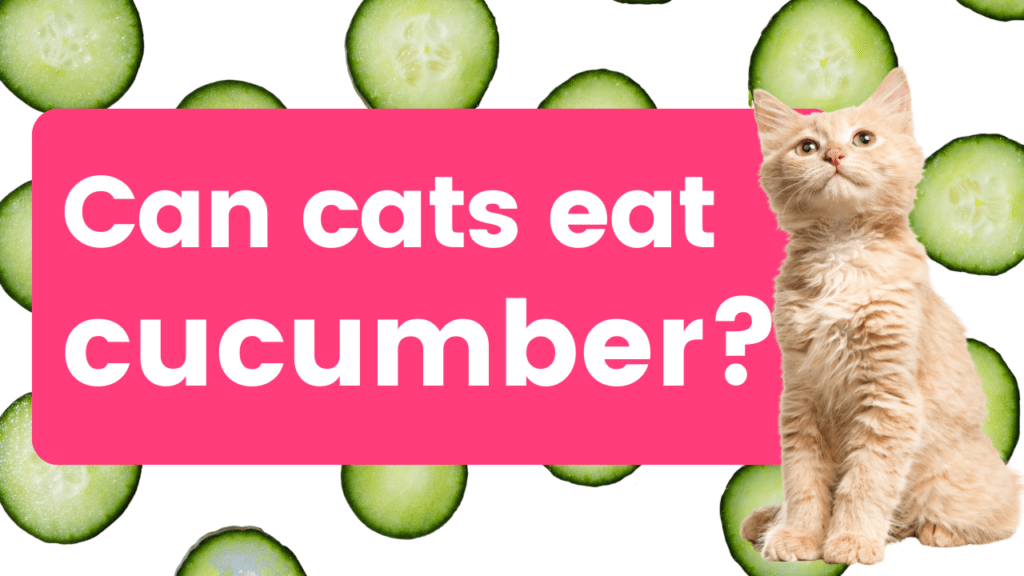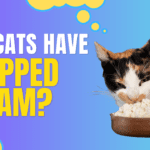To keep our feline friends healthy and happy, we need to pay close attention to what they eat. You, the pet owner, may wonder if cucumbers are a nutritious and safe treat for your feline friend. In this post, we will discuss whether or not cucumbers are safe for cats to eat, as well as their nutritional worth, benefits, and hazards, and how to introduce your cat to this new vegetable.

Can Cats Eat Cucumbers?
Cats can eat cucumbers without risk. They’re refreshingly crunchy, low in calories, and fat-free. But keep in mind that not all felines appreciate the crisp, cool flavor of cucumbers. It’s possible that some cats won’t care, while others may be curious and maybe even grow to like them..
Nutritional Value of Cucumbers
Because of their high water content, cucumbers are good for cats, especially in the summer. They are a good source of vitamin K, vitamin C, potassium, and magnesium, among other vitamins and minerals. Cucumbers can be a fun treat for cats, but they shouldn’t replace the cat’s usual diet because they lack the necessary nutrients.
Benefits of Feeding Cucumbers to Cats
Cucumbers are a healthy addition to a cat’s diet and may provide additional benefits. To begin, your cat can benefit from cucumbers’ high water content, which aids in hydration. Cucumbers’ crunchiness can also assist oral health by preventing plaque formation and improving breath.
Cucumbers, being low in calories, can be used as a weight-controlling substitute for high-calorie cat treats. Cucumbers are a healthy and low-calorie food that could help your overweight cat.
Risks and Precautions
Cucumbers pose little to no danger to cats, but there are some measures you should take. The cucumber peel should be removed because it is difficult for cats to digest and may induce diarrhea. Choking concerns can be reduced by cutting the cucumber into small, bite-sized pieces.
In addition, introducing cucumbers quickly to the diet of a cat may result in diarrhea or gastrointestinal discomfort due to the cat’s sensitive stomach or preexisting digestive difficulties. If you see any unusual behavior or symptoms after introducing a new food to your cat, you should contact your vet immediately.
How to Introduce Cucumbers to Cats
It’s important to introduce cucumbers to your cat gradually while keeping an eye on their reaction. Start by giving them a little slice of cucumber. If your cat seems to enjoy it and has no adverse reactions, you can feed it more. Keep in mind that your cat may not share your enthusiasm for cucumbers if it shows little interest in trying one.
Alternatives to Cucumbers for Cats
There are many other fruits and vegetables that are safe for cats to eat if your cat doesn’t like cucumbers or you just want to give them a little variation in their diet. Carrots that have been steamed or boiled, pumpkin chunks, or watermelon slices (without the rind or seeds) are also viable possibilities. Any food you give your cat must be checked for safety and digestive suitability before you give it to them.
Tips for Introducing Cucumbers to Cats
If you have decided to introduce cucumbers to your cat’s diet, here are some useful tips to ensure a smooth transition:
- First, try providing your cat very small pieces of cucumber to nibble on. See how they react, and make sure they appreciate the flavour and consistency.
- Cucumbers can be added to your cat’s regular diet by being finely diced or pureed and then being mixed in with the food they normally eat. They can ease into the new flavour in this way.
- Keep an eye out for negative reactions: After introducing cucumbers to your cat, keep a watchful check on their behaviour and digestion. If your pet starts showing indications of distress, including vomiting or diarrhoea, you should stop giving them cucumbers and see a vet right once.
Conclusion
In sum, cats can eat cucumbers, but you should introduce them slowly and keep an eye on their reaction. In addition to being a low-calorie treat, cucumbers can help cats stay hydrated and maintain good oral health. It is essential, however, to peel them and cut them into bite-sized pieces. Always take into account your cat’s unique dietary needs and preferences. If you’re thinking of switching your cat to a new food, it’s always best to check in with your vet first.
FAQs (Frequently Asked Questions)
- Are cucumbers edible for all cats? While most cats can safely eat cucumbers, not all cats will like them. Others might not be interested, while still others might not enjoy the flavor or texture. You should respect your cat’s tastes and avoid pressuring it to eat cucumbers.
- Are there any dangers involved in giving cats cucumbers? In general, cats can eat cucumbers. To avoid choking and to improve digestion, it is essential to peel the fruit and cut it into bite-sized pieces. If they are introduced to cucumbers too early or if they already have digestive problems, some cats may develop upset stomachs.
- Can a cat’s regular diet be replaced by cucumbers? No, a cat’s regular diet shouldn’t be substituted with cucumbers. They ought to be viewed as a rare treat or addition to their balanced cat food. The nutritional density of cucumbers is insufficient to give cats all the nutrients they require.
- Can cats consume cucumber-based pickles? Pickles frequently contain salt, vinegar, and spices, all of which are toxic to cats. Pickles and other pickled cucumbers should not be given to cats because of the high salt content, which can be harmful to their health.
- Are there any other types of produce I may give my cat? Yes, you can give your cat other fruits and veggies as well. Steamed or boiled carrots, small servings of cooked pumpkin, or slices of watermelon without the rind or seeds are a few options. Any food you provide your cat should always be secure and suited to their digestive system.
Disclaimer:
At TheCatCare.org, we take great care to ensure that the information we provide is accurate, up-to-date, and reliable. However, it’s important to note that we are not medical advisors or licensed veterinarians, and the information we provide should not be considered a substitute for professional advice.

Franky Watson is a certified pet care specialist with over 10 years of experience working with animals of all kinds. He has a degree in veterinary science and is passionate about educating pet owners on how to provide the best possible care for their furry friends. In addition to writing articles on pet care topics, Franky Watson also volunteers at local animal shelters and fosters animals in need. When he’s not caring for animals, he enjoys hiking and spending time with her own pets, including two cats.



